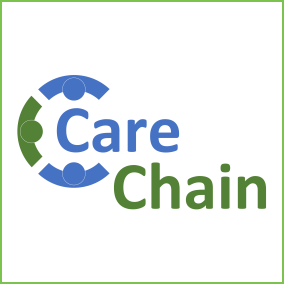
ABOUT THE PROJECT
CARECHAIN: Supporting CARE through microinsurances using blockCHAINs
Insurtech is exponentially changing the insurance industry, transforming customer experience and breaking with industry dogmas, for example in microinsurance (insurance for increasingly smaller customer segments). Some microinsurances are based on parametric triggers for quick payouts depending on measurable factors: for example, policies for farmers based on damage a particular type of crop is likely to suffer under specific conditions, e.g. 100 mph winds; when those are met, the farmer receives compensation. Without inspectors evaluating damages, claims can be quickly settled, allowing claimants rapid access to funds to keep businesses running.
Although microinsurance has been extended in developing countries, recently, these products have gained popularity in developed countries (after 2008 financial crisis and after COVID-19 pandemic). It is now more necessary than ever to investigate technological solutions to provide citizens with agile mechanisms for contracting social protections such as microinsurance, favoring the revitalization of economic activity. Mobile apps allow to speed up contracting, reduce transaction costs and, in epidemic circumstances, help maintaining distancing. However, it is necessary to guarantee secure microinsurance contracting. Distributed Ledger Technologies (DLTs), e.g. blockchain, make it possible to record transactions in an encrypted and distributed manner. Using DTLs, smart contracts can be built, and automatically executed when conditions are met. This information can be obtained from outside the blockchain using oracles, making smart contracts ideal for managing parametric microinsurances.
From Eurostar and BISITE research group (University of Salamanca, Spain), we propose CARECHAIN project, to research in DLTs, including blockchain and DAGs/tangles, to build an environment for executing of smart contracts to manage parametric microinsurances. Oracles will be exploited to read external conditions, execute SCs and provide the coverage. The main results of CARECHAIN will focus on the construction of an online platform and an environment for the execution of smart contracts for contracting and managing parametric microinsurances.
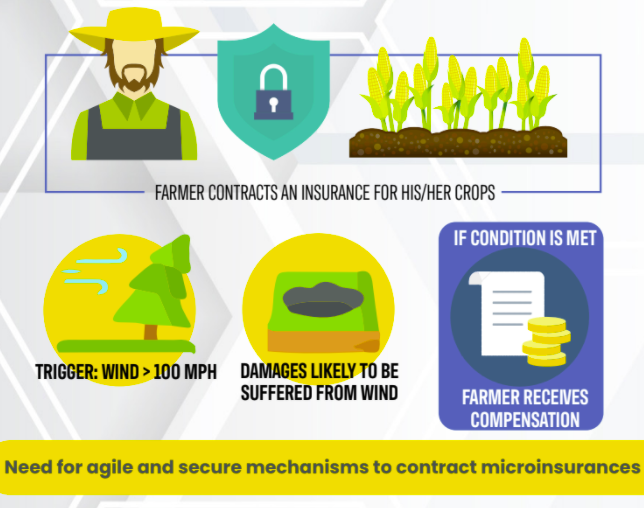
Motivation for the project:
It will provide a trustworthy online microinsurance contracting open API transparent service via Smart Contracts and oracles, an entry point for ONTOCHAIN into Fintech/Insurtech, the most trust demanding sectors for online operations, and will have huge impact in the EU insurance industry, enabling future innovations in line with NGI initiative.
Generic use case description:
To contract a microinsurance, a user connects to CARECHAIN, selects a suitable one, including conditions triggering it, which creates a Smart Contract. When conditions are met and read by oracles, the SC is executed, automatically sending compensation. Transactions are auditable and immutable.
Essential functionalities:
The essential functionalities of CARECHAIN include a Smart Contract execution environment for the contracting, managing and execution of parametric microinsurances, and oracles for the verification of the parameters/conditions. An open API will be provided, which will allow other projects in ONTOCHAIN to access to the services from CARECHAIN.
How these functionalities can be integrated within the software ecosystem:
Both the Smart Contract environment and the oracles will have their respective services provided through a standardized and documented open API, facilitating its use and integration into ONTOCHAIN software ecosystem. Services provided by modules in ONTOCHAIN ecosystem, e.g. DART (oracles) and GIMLY (SSID), will be studied to be used in CARECHAIN.
Gap being addressed:
Lack of agile mechanisms for individuals to contract, manage and receive compensation from microinsurances easily and securely, an actuarial product with a lot of momentum in EU insurance market. Additionally, given distancing measures due to COVID-19, an online platform will help in reducing physical interactions, facilitating the procedure.
Expected benefits achieved with the novel technology building blocks:
The novel technology in Smart Contracts and oracles for contracting and executing parametric microinsurances, resulting from CARECHAIN, will allow individual policy holders to securely and transparently contract and manage microinsurances in an agile way, and will allow to expand their use to other cases in Insurtech/Fintech.
Potential demonstration scenario:
A user connects to CARECHAIN platform resulting from the project, then selects and contracts a microinsurance, e.g. for a farm plot, with all procedure steps (e.g. necessary data, payment). When the parameters are met, e.g. winds>100MPH, the microinsurance is executed, compensation is sent to the user. All in a secure, online, accessible, and easy way.
PROJECT OUTCOMES
An application and environment for the execution of smart contracts for parametric insurance triggered by the conditions measured by IOT connected sensors. This solution is specifically demonstrated in this project for agriculture micron insurances, i.e., for insurances which are paid in the case of storms, but this is only one of the possible applications.
Parametric insurance is a type of insurance contract that insures against the occurrence of a specific event by paying a set amount based on the occurrence or magnitude of the event, not on the basis of the magnitude of the losses as in a traditional indemnity policy. Parametric insurances allow saving the cost of verifying losses in specific cases and are definitely faster as far as the payment time.
Parametric insurance are automatically executed in the case that specific clauses are executed, like :
-
In case a value exceeds lower or upper limit as measured by IoT sensors (E.g., The temperature in transport must be kept at 0ºC)
-
In the case of a clause ending on a certain date (E.g., a rental car is returned late)
-
In case a clause is terminated by both parties, manually and not verifiable by sensors and oracles.
The solution uses Ethereum Smart Contracts, and more specifically:
-
ERC735 Claim Holder Registry: Add, delete or retain clauses certified by third parties or self-certified.
-
ERC930 Eternal Storage: Update Smart Contracts deployed , through proxies, deploying new and keeping the old ones referenced.
Users interact with the system through the web application and will be able to manage oracles and sensors. The sensors will communicate with the backend via REST API or MQTT. Oracles will retrieve information from the sensors, periodically they will check that the contract terms are fulfilled. If not, they will put the Smart Contract on alert.
Repositories:
GitHub: https://github.com/ONTOCHAIN/CARECHAIN
Code deployment and running instruction documents: https://github.com/ONTOCHAIN/CARECHAIN/tree/main/Carechain_backend
Currently open to the ONTOCHAIN community only. Reach out if you need access.
Documentation:
API specification (Swagger): https://app.swaggerhub.com/apis/dval/Carechain/1.0.0
More details:
Use case Scenario
The use case which has been developed and demonstrated is for agricultural micro insurance, in which the insured farmer will receive automatic compensation in case of high intensity storms as identified in his area by the IOT network. This use case has three actors, the insurance company (provider), the representative of the insurance company and the final customer (i.e., the insured farmer). The most relevant interactions in this case are:
Providers create a template of clauses, the platform transforms it to
- Smart Contract
- Representatives will choose one of the templates and complete it with detailed clauses
- Customers sign micro insurances between the representatives and themselves, so they use their own digital signature.
- Using oracles when some clause breaks, the customer will receive an automatic compensation
These kinds of insurances have been initially used in some developing countries, but could take off also in developed countries.
In any case, the solution and their APIs could be integrated in the future with other kind of applications, as:
- Logistic, especially for the food logistic, to trigger actions when the temperature of the transport is not within contractual limits
- Others
ONTOCHAIN partners that support the scenario
The CARECHAIN application has been integrated with ADOS as a backend. ADOS provides a decentralized oracle system for IoT, including the detection of anomalous conditions, e.g., identifying sensors not working properly.
A first feasibility study of integration has been implemented with the project DESMO-LD, which considers as well the integration with IOT sensors and its parametrization.
TEAM
Associate Professor USAL, expert in AI for Smart Cities, Blockchain and Bayesian inference, in charge of research and integration in ONTOCHAIN ecosystem.
Titular Professor USAL, expert in Virtual Agent Organizations, Cloud Computing and Security, in charge of research and result dissemination in CARECHAIN.
Deputy general manager of Eurostar, expert in management, ERP, financial and legal administration, as project coordinator ensuring CARECHAIN correct development.
R&D digital platform designer and systems administrator, expert in computer systems and cloud platforms, coordinating design and deployment of CARECHAIN architecture.
ENTITIES
BISITE research group – University of Salamanca (USAL)
Multidisciplinary research public group at the historical Spanish University of Salamanca, whose focus is the development and application of intelligent computer systems.
Multimedia business group with a long trajectory in creating contents, with subsidiaries in a span of areas: e.g. voting systems for major Spanish TV and radio channels, market/social research, or managing cultural events.
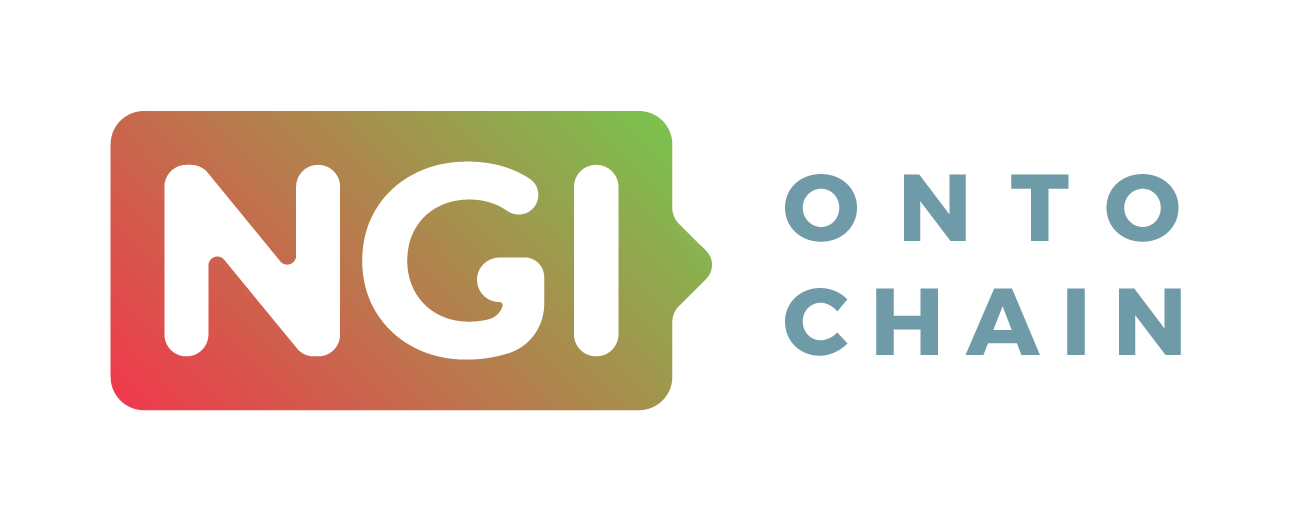

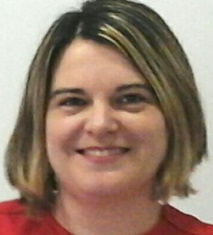
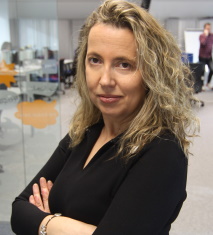
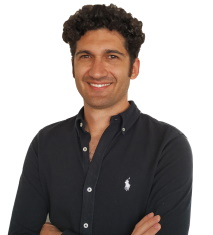
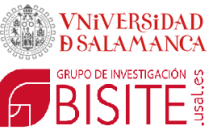

 This project has received funding from the European Union’s Horizon 2020 research and innovation programme under grant agreement No 957338
This project has received funding from the European Union’s Horizon 2020 research and innovation programme under grant agreement No 957338




